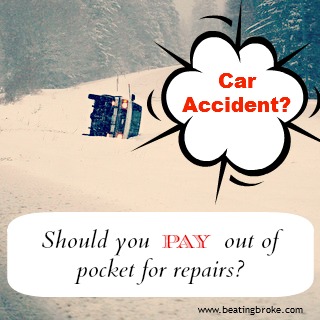Our Chicago winter this year has been a lot less like a Midwest winter–the snow storms have been few and far between. A few weeks ago we finally got hammered by a storm that dumped 10 inches over the city. At the height of the snow storm I had to pick up my son from school. As I waited at a stop sign, the driver behind me bumped into my bumper.
Luckily, the damage wasn’t bad. When I took it to a repair shop for an estimate, they thought it would cost between $580 and $1,200 to fix depending on if there was any damage inside the bumper when they take it off to repair it.
Surprisingly, the woman who hit me decided she wanted to pay out of pocket rather than go through insurance. When I told her that the repair would take 2 to 3 days and we’d need a rental car during that time, she agreed to cover that cost, too.
This is the second time I’ve been rear-ended in 5 years, and both times the repairs were less than $2,000. Both times the drivers opted to pay out of pocket.
If you’re in a minor fender bender, should you pay out of pocket rather than going through insurance?
Reasons You May Want to Pay Out Of Pocket

2. If your insurance premium will increase substantially. Each insurance company is different, but rest assured that if you cause an accident and file a claim, your insurance will increase. Some insurers increase your premium by 10% and others by 20%. You may be able to call your insurer and ask how much the premium will go up before you decide to pay a claim or not.
3. If this is your second accident. While you’ll pay an increased premium for one accident, if you file two claims within a few years of one another, the increase is substantial. For instance, State Farm generally charges a 10% increase in premium for the first claim, but that amount increases to 45% for the second claim. While it may hurt your budget to come up with a thousand or two to pay out of pocket for the repairs, that may be the better option if you’re facing a substantial increase that could last several years.
4. If your insurance doesn’t have an accident forgiveness clause. Some insurers offer an accident forgiveness clause, meaning, if you’ve been with the company for a certain number of years (usually 5 to 9) with no accidents, the insurance company won’t increase your premium on the first accident you file. Again, though, you may want to save this benefit for a more substantial accident that you can’t afford to pay out of pocket rather than when the repair is relatively minor.
If you cause an accident, don’t automatically file a claim. There are benefits to paying out of pocket. You just need to understand your insurance policy as well as know exactly how much the repairs will cost before making a decision.
If you’ve caused an accident, did you pay out of pocket rather than filing a claim?
Original img credit: Oops, by fortes on Flickr
Related articles
Melissa is a writer and virtual assistant. She earned her Master’s from Southern Illinois University, and her Bachelor’s in English from the University of Michigan. When she’s not working, you can find her homeschooling her kids, reading a good book, or cooking. She resides in New York, where she loves the natural beauty of the area.






 Once you know the requirements of the state and any lien holders, you’ve got to decide on the level of car insurance coverage you want. There are two ways to look at this. The first is that you’ve got to find a coverage and provider that is affordable enough to fit into your budget. The second is usually the forgotten way of looking at insurance. The coverage doesn’t just have to fit into your budget, it also needs to cover you against a total loss. If you have full coverage, but it’s only enough to cover a portion of what you owe on the car, you’ll also want to look at something that’s usually called “Gap Insurance”. Gap insurance is aptly named in that it is designed to cover any gap between the value of the car and the remaining loan should the car be totaled before you pay it off. Car insurance can be a combination of three coverages. A liability coverage (usually what States require), Comp & Collision, and personal injury. The exact levels that you need will vary based on your situation, but your insurance provider should be able to make recommendations for you.
Once you know the requirements of the state and any lien holders, you’ve got to decide on the level of car insurance coverage you want. There are two ways to look at this. The first is that you’ve got to find a coverage and provider that is affordable enough to fit into your budget. The second is usually the forgotten way of looking at insurance. The coverage doesn’t just have to fit into your budget, it also needs to cover you against a total loss. If you have full coverage, but it’s only enough to cover a portion of what you owe on the car, you’ll also want to look at something that’s usually called “Gap Insurance”. Gap insurance is aptly named in that it is designed to cover any gap between the value of the car and the remaining loan should the car be totaled before you pay it off. Car insurance can be a combination of three coverages. A liability coverage (usually what States require), Comp & Collision, and personal injury. The exact levels that you need will vary based on your situation, but your insurance provider should be able to make recommendations for you.